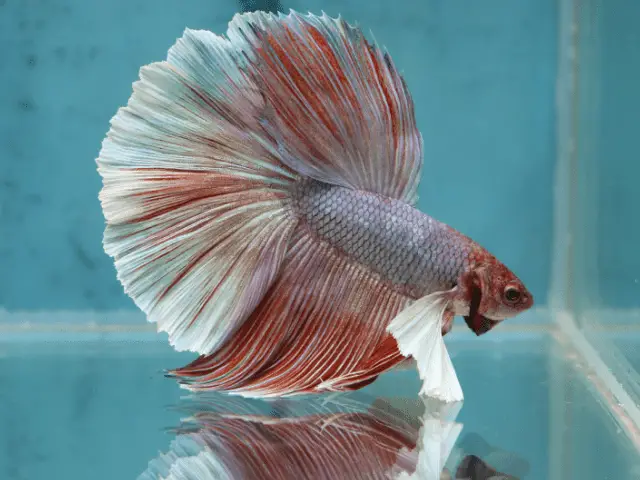Originally posted on May 17, 2023 @ 2:00 pm
Last Updated on 2 months by admin
Betta fish are one of the most popular aquarium fish around the world. However, it is not uncommon to see them floating vertically head up, which can be a sign of a serious health issue. In this article, we will explore the causes of this behavior and the best treatment options to ensure the health and happiness of your betta fish. So, if you own a betta fish or are considering getting one, read on to learn more about this common problem and how to solve it.
Seeing your betta fish floating vertically head up can be alarming, but it’s important not to panic. There are several reasons why this behavior occurs, including swim bladder disease, constipation, and even stress. By understanding the causes and symptoms, you can take the necessary steps to treat your betta fish and prevent future occurrences. In this article, we’ll delve deeper into the causes and treatments of this problem, so you can give your betta fish the care it deserves.

Betta Fish Floating Vertically Head Up: Causes and Treatment
Are you worried about your betta fish floating vertically with its head up? This can be a sign of a serious health problem that needs immediate attention. In this article, we’ll discuss the causes and treatment options for this condition.
Causes of Betta Fish Floating Vertically Head Up
There are several reasons why your betta fish may be floating vertically with its head up. Here are some of the most common causes:
Swim Bladder Disorder
Swim bladder disorder is a common cause of betta fish floating vertically with its head up. The swim bladder is a small organ that helps the fish maintain its buoyancy. When the swim bladder is damaged or infected, the fish may have difficulty swimming and may float vertically.
Constipation
Constipation can also cause betta fish to float vertically with their head up. When the fish is constipated, its digestive system may be backed up, causing it to float.
Water Temperature
If the water temperature in your betta fish tank is too cold, it can cause the fish to float vertically with its head up. Betta fish require a water temperature of around 78 degrees Fahrenheit to stay healthy.
Bacterial Infection
A bacterial infection can also cause betta fish to float vertically with their head up. This can be a serious health problem that requires immediate treatment.
Treatment Options for Betta Fish Floating Vertically Head Up
The treatment for betta fish floating vertically with their head up will depend on the underlying cause of the problem. Here are some treatment options:
Swim Bladder Disorder
If your betta fish is suffering from swim bladder disorder, you can try feeding it a diet that is high in fiber. This can help regulate its digestive system and reduce the symptoms of the disorder. You can also try raising the water temperature in the tank to help the fish recover.
Constipation
If your betta fish is constipated, you can try feeding it a diet that is high in fiber and low in fat. You can also try adding a small amount of Epsom salt to the water to help the fish pass its stool.
Water Temperature
If the water temperature in your betta fish tank is too cold, you can try raising it to around 78 degrees Fahrenheit. You can also try adding a heater to the tank to maintain a consistent temperature.
Bacterial Infection
If your betta fish is suffering from a bacterial infection, you will need to treat it with antibiotics. You can purchase antibiotics for fish at your local pet store or online. It’s important to follow the instructions carefully to ensure that the fish receives the proper treatment.
In conclusion, betta fish floating vertically with their head up can be a sign of a serious health problem. If you notice this behavior in your fish, it’s important to identify the underlying cause and seek treatment as soon as possible. By following the tips outlined in this article, you can help your betta fish recover and maintain its health.
Frequently Asked Questions
Betta fish are popular pets for their vibrant colors and personalities. However, they are prone to various health problems, including floating vertically with their head up. Here are some frequently asked questions about the causes and treatment of this condition.
What causes a betta fish to float vertically with its head up?
There are several possible causes of this condition, also known as “buoyancy disorder.” One common cause is overfeeding, which can lead to constipation and swim bladder problems. Other possible causes include bacterial infections, parasites, and genetic factors.
It’s important to identify the underlying cause of the condition in order to provide proper treatment and prevent further health problems. So, if you notice your betta fish floating vertically with its head up, it’s best to consult with a veterinarian or experienced fish keeper.
How can I treat my betta fish with buoyancy disorder?
The treatment for a betta fish with buoyancy disorder depends on the underlying cause of the condition. If the cause is overfeeding, you can try feeding your fish a small amount of food once or twice a day, rather than one large meal. You can also switch to a high-quality, easily digestible fish food.
If the cause is bacterial or parasitic infection, you may need to administer medication prescribed by a veterinarian. In some cases, buoyancy disorder may be a symptom of a more serious health problem, so it’s important to seek professional advice.
Can I prevent my betta fish from developing buoyancy disorder?
While some causes of buoyancy disorder, such as genetic factors, cannot be prevented, there are some steps you can take to reduce the risk of your betta fish developing this condition. One of the most important things is to maintain good water quality in your fish tank. This means performing regular water changes and avoiding overfeeding.
You can also choose a high-quality fish food that is specifically formulated for betta fish and is easily digestible. Finally, monitor your fish’s behavior and health regularly, so you can catch any problems early on and seek treatment promptly.
How long does it take to treat buoyancy disorder in a betta fish?
The length of time it takes to treat buoyancy disorder in a betta fish depends on the severity of the condition and the underlying cause. In some cases, simple changes to the fish’s diet or environment can resolve the problem within a few days. In more severe cases, medication or other treatments may be necessary, and it may take several weeks for the fish to fully recover.
It’s important to be patient and persistent with treatment, and to seek professional advice if the condition does not improve or if other health problems develop.
Is buoyancy disorder fatal for betta fish?
While buoyancy disorder can be a serious health problem for betta fish, it is not necessarily fatal. With proper treatment and care, many betta fish are able to recover from this condition. However, if left untreated, buoyancy disorder can lead to other health problems and can ultimately be fatal. So, if you suspect that your betta fish has buoyancy disorder, it’s important to seek professional advice and take steps to treat the condition as soon as possible.

Why is My Betta Fish Floating on its Side?
In conclusion, betta fish floating vertically head up can be caused by a variety of factors. It is important to observe your fish’s behavior and environment to determine the underlying cause. Common causes include swim bladder disorder, constipation, and poor water quality.
Fortunately, there are several treatment options available to help your fish recover. These include fasting, feeding a high-fiber diet, and performing water changes. In severe cases, medication may be necessary.
As a responsible betta fish owner, it is important to provide a healthy and stimulating environment for your fish to thrive in. Regular maintenance and observation can prevent health issues and ensure a happy and active betta. Stay informed and attentive to your fish’s needs for a long and enjoyable companionship.
